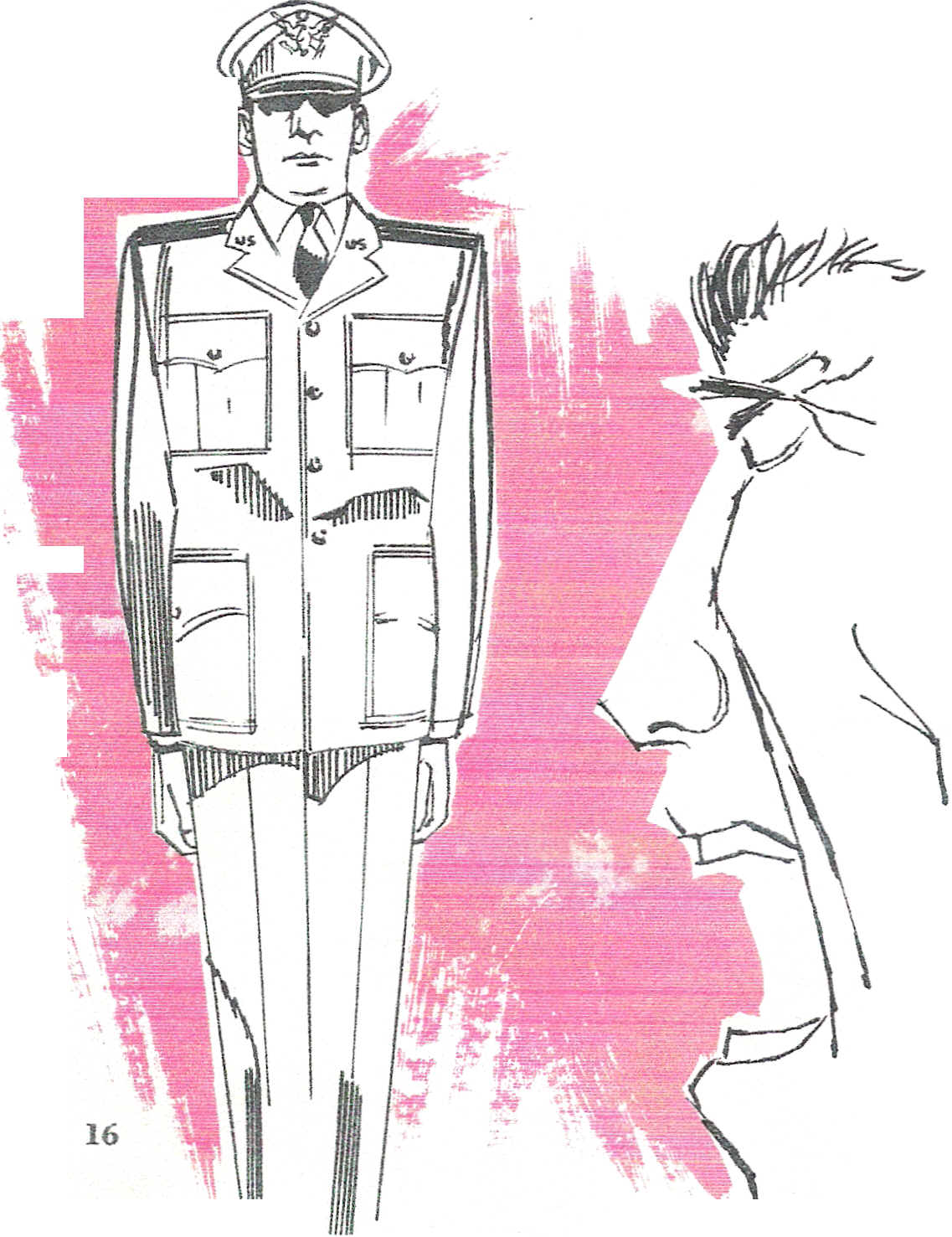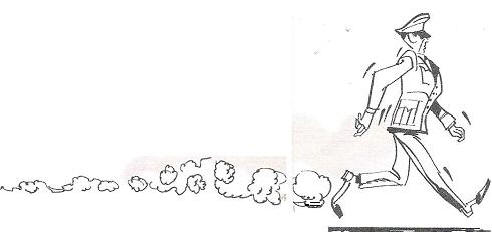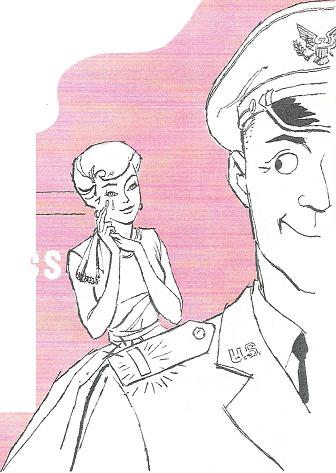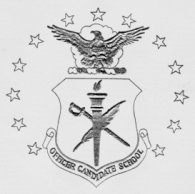|
As OCS becomes history, a
former OC reminisces:
"Hello, honey. I've only got a second.
How does Fog go?"
"Where are you calling from? I didn't know you
could phone from the school."
"Never mind that, I've only got a second. How
does Fog go?"
"Fog?"
"Yes, Fog."
"I guess the wind blows it away, silly. How
would I know how fog goes?"
"No, you don't understand. I don't mean fog,
I mean Fog, the poem by Carl Sandburg. One of those
upperclass -- er -- gentlemen, wants me to recite it this afternoon.
One slip
and I've had it. I've got my full share of gigs this week.
One more and I'm ramped over.
And there go our picnic plans."
"Where can I get it?"
"Probably at the library. Now be sure to get
eve4ry word of it. Look, I probably won't be
able to call back. Getting to a phone is too difficult.
When you bring my uniforms this
afternoon, slip the poem into the left shirt pocket. Okay?"
"I'll try."
If Betty hadn't come through with that verse it
would have meant spending my Sunday
afternoon marching in the hot Texas sun rather than relaxing with my
family. And we didn't
get to see much of our families in those days.
It all seems funny now. It was anything but
humorous at the time. To those of you who have never enjoyed
the experience of Officer Candidate School, the whole thing may seem
a little ridiculous. It was a program you had to be a part of
to really appreciate.
The problem of getting Fog was just one of
the hundreds of little off-beat dramas that used to unfold in the
lives of OC's. I've intentionally mentioned this incident
because it involves what most of us soon came to realize was a vital
part of the program--our wives. Many of us, I dare suspect,
would never have made it through those six months without the help of
our devoted, understanding, sympathetic, and frequently harried
better-halves.
Out of the Frying Pan
For those of us who were a part of Class 57-D, the last day of June
1957 was one of the most hectic we have ever experienced. It
was the day we first gathered "on the hill" for our introduction to
each other and to the way of life called OCS.
What
followed in the next few weeks was a self-imposed Hades on earth.
But we had asked for it. Numbering 176 at the outset, our class
was rapidly divided into six squadrons, each supervised by a group of
men who had survived the first three months of OCS and who were now
to control the military training program for their final 12 weeks.
Our first impresion of the first classmen was not one of fondness.
To be blunt, we abhored them.
During that first long
afternoon and evening their firm, barking voices shattered any
semblance of mental equilibrium on our part. The sounds still
echo in memory.
"Wrinkle that chin! Throw out
that chest! Swallow your stomach! Stand straight!
You're an OC now!
"Sound off, mister! I want to
hear that light bulb ping when you hit ten-SHUN!"
Or
the call that summoned us pell-mell to our assigned locations along
the corridor wall, to stand at rigid attention while some new
tidbit of information was revealed. June 1963 15
|
|
"On the wall! On the double!"
Or that
first morning. Did you ever try to share two
sinks with 15 other men and complete shaving in less
than 30 seconds? That's about all the time you
had, if
everyone was to get his whiskers trimmed in the allotted hour.
Then that first inspection by dawn's early light.
I can hear those dulcet tones now.
"What did you shave with this morning, a broken coke bottle? "Get with it mister!"
The whole thing was pretty much of a shock to most of us. We hadn't expected a picnic. Almost all of us
had been sergeants. On the average we had been in
the Air Force over five years, were married and had two or three children each. It had been a long time
since we had been through basic training, but we soon
discovered that this program just began where basic left off.
We had to learn how to walk, to speak, to sit, and
even how to eat.
Walking came at an accelerated pace, a half-walk,
half-run
executed while at attention. All corners, indoors and out,
had to be squared. At first it was rough on your legs and even
rougher on a former sergeant's
dignity.
 
Stiff Backs, Stiffer Necks
It seemed you never relaxed. You sat at attention
with your back exactly six inches away from the back of your chair. You ate
what we called squared--not to be confused with square--meals.
That meant that YOU raised YOUR right arm vertically and across
horizontally. Every motion was either on a straight line or at a
sharp right angle. Your head was cemented in one position and your
eyes remained caged (frozen straight ahead). Just one side glance
would bring forth a first classman's query: "What are you looking at,
mister? You want to buy the place?"
We acquired a whole new language, learning about
"woolybuggers" (pieces of lint that appeared from nowhere during
inspection) and "cables" (any string, however small, protruding from
your uniform).
Confusion reigned supreme at first. But it didn't
take long before we discovered the whole secret of success. It wasn't
just a school solution. The formula was surprisingly simple. The
phrase we used was "Cooperate to Graduate."
We soon learned that there was a reason for
everything, even those rules which seemed most foolish. Caged
eyeballs, for instance, developed our peripheral vision.
There was no question but that we were being
pushed to our "elastic limit," as they called it. They didn't want us
to crack, but they wanted to see how much we could take. It was
essential to know if a future officer could still carry on if he
became angry, tired, and sometimes discouraged. If he couldn't, OCS
wasn't for him.
Unfortunately, 70 of those in 57-D failed to
graduate. Most Were those who couldn't see any reason for the intense
pressure and immediately resigned. For the rest, adjustment came
rapidly.
With that adjustment came a fierce pride. We would
settle for nothing less than first. We referred to air cadets in
adjacent barracks as "gadgets," and were convinced that no other
school in USAF or elsewhere was the equal of OCS. I must confess that
most of the former OCs I know still carry that same conviction.
Complete Training
The officers who supervised OCS employed what they
termed a "tri-dimensional" approach to education. It called for
developing the student in relation to the requirements of job, social
setting, and himself-the man. Training was directed toward the
mental, spiritual, physical, and cultural requirements demanded of
each future officer.
Their task was immense. The time? Only 24 weeks.
June 1963
16
|
|

From the student's viewpoint, perhaps the hardest part of the program
was having your family so close, yet being able to see
precious little of them. For the first few weeks contact came only
during Sunday church services. Then a weekly social get-together at
the OCS Club reunited husband and wife on Saturday evenings. Finally,
after what seemed like an eternity, weekend passes were
authorized-for those who weren't ramped over.
The machine hasn't been developed, nor will it
ever be, that can begin to duplicate the versatility of the typical
OC wife. In 57-D we even had a nickname for the gals. We called them
Hazel Heartthrob.
Most of the gals and their offspring lived at
Billy Mitchell Village, an apartment area some seven miles from OCS.
They were a self-sufficient lot. They had to be. Much of their day
was devoted to ironing and starching our uniforms after they had been
returned from the cleaners. It took a good hour to get a set of 505s
in inspection order after a commercial laundry cleaning. That
included removing every loose thread. A single cable could mean an
hour on the ramp.
Upper Crust
Suddenly, after what seemed like years, you were
no longer second class. Three months had passed and you awoke one
morning to find yourself in the role of a. first classman. For weeks
you had looked forward tQ this day, only to discover that actually
running the school's military training program was even more
difficult than taking orders. With the additional responsibility and
work came greater confidence and an even stronger appreciation of the
need to "Cooperate to Graduate."
The program has changed in many ways from its
birth at Miami Beach in February 1941. From the spring of 1944 until
1961 it made its home at Lackland AFB. For the past two years it
moved to nearby Medina Base. Now it hardly seems possible that the
school's final class graduates this month. With it, OCS becomes a
thing of the past.
In the 21 years since it was founded approximately
45,000 officers earned their commissions through OCS. Among their
ranks were such luminaries as Jimmy Stewart, Ben Hogan, Hank
Greenberg, Clark Gable, Cary Grant, Russell Brown, George Kendrick,
Robert Botts, and Joseph Manske.
To theatergoers and sports fans the names Stewart
through Grant are familiar. Who were Brown, Kendrick, Botts and
Manske?
Russ Brown (43-D) received the DFC for manning
four different gun positions on his crippled B-17 after his comrades
had been put out of action.
George Kendrick (44-G) and his crew earned two
Medals of Honor and seven distinguished service citations during
World War II.
Robert Botts (43-H) disposed of three Japanese
Zeroes within two minutes.
Joe Manske (42-F) was one of the men who
accompanied Jimmy Doolittle on his epic Tokyo raid.
In these men are written the training, spirit and
pride associated with the Air Force's six-month program for
transforming career-motivated airmen into commissioned officers.
Times and needs have changed. Increasing demands
for formal education and technical knowledge have created new paths
to commissions for USAF airmen. Officer Training School and the
Airman Education and Commissioning Program have eliminated the
requirement for OCS.
OCS is about to become a thing of the past, but
for those of us who were once a part of the program it will always
occupy a warm spot in our memories. The highest tribute the school
ever received comes from ex-OCs in their oft-repeated phrase: "It was
a great experience, b ut I wouldn't want to do it again." ut I wouldn't want to do it again."
June 1963
17
|



